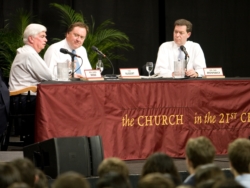Catholic presidential candidates share views on faith, policy at BC forum
NEWTON -- Two Catholic senators and presidential candidates -- Sen. Chris Dodd, D-Conn., and Sen. Sam Brownback, R-Kan. -- shared their views on their faith and how it affects their public policy decisions April 23 at Boston College’s Conte Forum.
“My faith has had a huge influence on me,” particularly the teaching of Catholic social justice, Dodd told the crowd of nearly 4,000. However, he underscored that “faith informs my decisions. It doesn’t define my decisions.”
Brownback, too, acknowledged that his faith is “a big part of the decision-making process.” A recent convert to Catholicism -- having entered the Church only four years ago -- Brownback noted, however, that most of his views predate his entrance into the Catholic faith.
Both senators agreed that all too often the concept of the separation of church and state has stymied the discussion of faith in regards to public policy.
“I think we’ve made a huge mistake” not talking about faith in the public sector, said Dodd. “People confuse the notion of having faith-based policy and replacing policy with faith beliefs.”
The separation of church and state is necessary, Brownback said, but it “shouldn’t be a wall so high that we can’t meet to talk.”
Moderated by Tim Russert, host of NBC’s “Meet the Press,” the senators spoke on issues such as abortion, same-sex marriage, the death penalty and the war in Iraq.
When asked about the war in Iraq, they both agreed on the need for President George W. Bush to meet with legislators to seek a resolution to the conflict.
“The only solution is a three state/one country solution,” Brownback proposed. “We’re not going to solve the Sunni-Shia fight.”
Dodd concurred, adding that Iraqis must themselves decide to resolve the conflict.
“There’s not a military big enough or a treasury deep enough if they don’t make a decision to end the conflict,” Dodd said.
When Russert asked the senators to express their views of the death penalty in light of the exoneration of Jerry Miller, the 200th person released from prison due to DNA testing, both supported the existence of capital punishment but said it should only be applied in extreme circumstances when public safety is at risk. In addition, both senators felt strongly that the entire prison system in the United States needs to be reformed.
“We have a national problem with this and it’s a big one,” stressed Brownback. He urged Boston College students to get involved in reforming the system.
The senators, however, disagreed sharply on other societal hot-button issues such as embryonic stem-cell research, abortion and same-sex unions.
Dodd indicated he is in favor of embryonic stem-cell research in cases where “the choice goes down to whether to discard embryonic stem cells or utilize them.” However, he noted he is opposed to human cloning.
Dodd also said that he is in favor of legal recognition of same-sex unions, though he added that he is “not comfortable” applying the term marriage to those unions.
Regarding abortion, he said he believes in a woman’s right to choose and expressed concern that the Supreme Court’s recent ruling on the Partial Birth Abortion Ban Act might not adequately take into account protection of a woman’s health. However, he noted that the government “bears an obligation” to try to reduce the numbers of abortions committed each year. To that end, he announced he is going to submit legislation that would promote adoptions in this country.
Brownback, who is opposed to embryonic stem-cell research, indicated that he believes the issue “boils down to one question: What is the youngest of humans -- is it a person or property?”
“What we’re doing with this is treating the youngest of humans as property,” he said. Alluding to the slave trade, Brownback added, “We’ve been down this road in human history before and we’ve always regretted it.”
Rather than support embryonic stem-cell research, Brownback believes the government should support adult stem-cell research, which has already been credited for treating 73 different diseases, most recently juvenile diabetes.
In addition, Brownback said he believes allowing same-sex marriage would weaken heterosexual marriages, noting that in European countries where same-sex marriages have been legalized, heterosexual marriages have sharply decreased.
On the abortion issue, Brownback, who is pro-life, rhetorically asked the crowd, “Is the youngest of humans entitled to the dignity of human personhood?”
Despite their differences, Dodd stressed the need for our nation’s leaders to “come together” to discuss ways to move beyond their ideological differences.
“The country is not as divided as we think on these issues,” he said.
“We’ve got to do a much better job than get into our respective corners, screaming at each other,” he said. Otherwise “the country sits there and wonders in disbelief what’s going on.”
The forum was presented by the Church in the 21st Century Center, which seeks to be a catalyst and resource for the renewal of the Catholic Church in the United States by engaging critical issues facing the Catholic community.
The center was formed in 2002 in response to the clergy abuse crisis, “to help the Catholic community in the United States move from crisis to renewal,” according to Boston College president Father William P. Leahy, SJ.
“I have to say [the Church in the 21st Century Center] has been successful beyond our hopes.”



















